
Steppenwolf was a Canadian-American rock band that was prominent from 1968 to 1972. The group was formed in late 1967 in Los Angeles by lead singer John Kay, keyboardist Goldy McJohn, and drummer Jerry Edmonton, all formerly of the Canadian band the Sparrows. Guitarist Michael Monarch and bass guitarist Rushton Moreve were recruited via notices placed in Los Angeles-area record and musical instrument stores.

The Cars were an American new wave band formed in Boston in 1976. Emerging from the new wave scene in the late 1970s, they consisted of Ric Ocasek, Benjamin Orr, Elliot Easton, Greg Hawkes (keyboards), and David Robinson (drums). Ocasek and Orr shared lead vocals, and Ocasek was the band's principal songwriter and leader.

The Steve Miller Band is an American rock band formed in 1966 in San Francisco, California. The band is led by Steve Miller on guitar and lead vocals. The group had a string of mid- to late-1970s hit singles that are staples of classic rock, as well as several earlier psychedelic rock albums. Miller left his first band to move to San Francisco and form the Steve Miller Blues Band. Shortly after Harvey Kornspan negotiated the band's contract with Capitol Records in 1967, the band shortened its name to the Steve Miller Band. In February 1968, the band recorded its debut album, Children of the Future. It went on to produce the albums Sailor, Brave New World, Your Saving Grace, Number 5, Rock Love, Fly Like an Eagle, Book of Dreams, among others. The band's Greatest Hits 1974–78, released in 1978, sold over 13 million copies. In 2016, Steve Miller was inducted as a solo artist in the Rock and Roll Hall of Fame.

Hank Brian Marvin is an English multi-instrumentalist, vocalist, and songwriter. He is known as the lead guitarist for the Shadows.
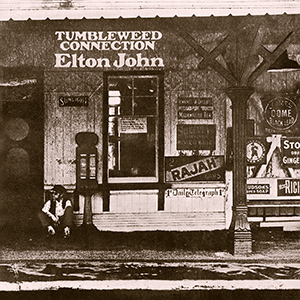
Tumbleweed Connection is the third studio album by English singer-songwriter Elton John. It was recorded at Trident Studios, London, in March 1970, and released in October 1970 in the UK and January 1971 in the US. It is a concept album based on country and western and Americana themes. All songs are written by John and Bernie Taupin, with the exception of "Love Song" by Lesley Duncan.
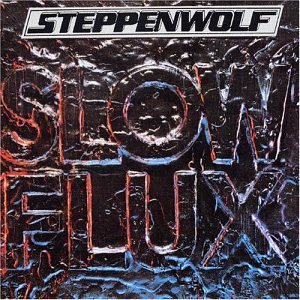
Slow Flux is the seventh studio album by Canadian-American rock band Steppenwolf. The album was released in August 1974, by Epic Records. In the US it was released on the Mums Records label, a short-lived CBS Records subsidiary. It was the first of three albums the band created after reforming in 1974 before they disbanded again in 1976. "Straight Shootin' Woman" was the last Steppenwolf song to chart on the Billboard magazine Top 40. The song "Children of the Night" notably posits that the hippie movement at this time had died, and president Richard Nixon is referred to as "the fool who believed that wrong is right".

Steppenwolf is the debut studio album by Canadian-American rock band Steppenwolf, released on January 29, 1968, on ABC Dunhill Records. It includes songs written by band members and songs written by others such as the Willie Dixon blues classic "Hoochie Coochie Man", retitled "Hootchie Kootchie Man".
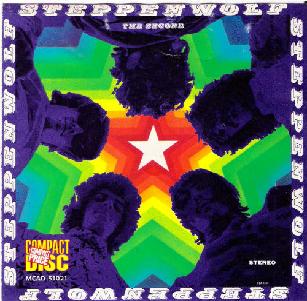
The Second is the second studio album by Canadian-American rock band Steppenwolf, released in October 1968 on ABC Dunhill Records. The album contains one of Steppenwolf's most famous songs, "Magic Carpet Ride". The background of the original ABC LP cover was a shiny "foil", in contrast to later LP issues and the modern CD sleeve.

Steppenwolf 7 is the fifth studio album by Canadian-American rock band Steppenwolf. The album was released in November 1970, by Dunhill Records. It is the first Steppenwolf album with new bass player George Biondo. The album’s numerical title reflects the fact that it was the band’s seventh album release for ABC/Dunhill records . While the album featured Steppenwolf's trademark rock and roll sounds, none of the songs were able to make the top 40. The album featured a cover of Hoyt Axton's "Snowblind Friend", their second cover of one of his antidrug songs. Along with "Who Needs Ya", it was one of two singles from the album which made the charts, but fell short of the top 40. The album track "Renegade" is autobiographical for lead vocalist John Kay, recounting his flight with his mother from the Soviet occupation zone to the West in 1948. The intro to "Earschplittenloudenboomer" is spoken by Kay partially in German.

For Ladies Only is the sixth studio album by Canadian-American rock band Steppenwolf. The album was released in November 1971, by Dunhill Records. It is a political concept album mainly about feminism but with several more conventional songs about romance as well, both unusual themes for Steppenwolf. Some critics saw the album as sexist, citing the lyrics of the songs and a photo of a car shaped like a penis alongside the Hollywood Walk of Fame in the gatefold. The album saw the band hinting toward the progressive rock movement that was popular at the time with more complex arrangements and sophisticated keyboard playing, particularly on the title track. Like their previous album, it was accompanied by two minor hit singles which fell just short of the Top 40.

Hour of the Wolf is the eighth studio album by Canadian-American rock band Steppenwolf. The album was released in September 1975, by Epic Records. Andy Chapin replaced long time keyboardist Goldy McJohn on this album.

Skullduggery is the ninth studio album by Canadian-American rock band Steppenwolf. The album was released in May 1976, by Epic Records. It was the third of four released by Epic Records, and the last to feature keyboardist Wayne Cook, who left to join Player in 1977. It is the also the last album to be released simply under the Steppenwolf name before the group rebranded themselves as John Kay & Steppenwolf.

George Michael Biondo is a musician who served as bass guitarist of the Canadian rock band Steppenwolf from April 1970 to October 1976. Born in New York, Biondo has been based in Southern California throughout a career as a session musician and songwriter.

Gold: Their Great Hits is a greatest hits album released by the Canadian-American hard rock band Steppenwolf. The album, released in 1971, charted at #24 on the Billboard Pop Albums charts and was certified "gold" by the RIAA on April 12, 1971. Initial pressings of the album came in a gatefold sleeve, with a detachable poster of the band.

Kent Henry Plischke, known as Kent Henry, was an American guitarist and songwriter best known for his contributions to Steppenwolf and Blues Image.

Wolftracks is an album by John Kay and Steppenwolf, released in 1982. It was originally released only in Canada and Australia. The album was the first new studio album in six years for John Kay, featuring a new line-up of Steppenwolf and Kay renaming the group accordingly.
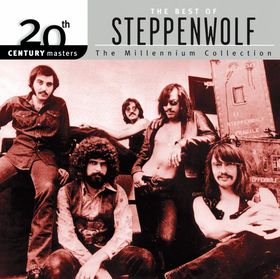
20th Century Masters – The Millennium Collection: The Best of Steppenwolf, released by Universal Music as part of their 20th Century Masters – The Millennium Collection series, is a CD that collects material by Steppenwolf from 1968 to 1971. The compilation focuses on Steppenwolf’s Dunhill recordings, with the bulk of material coming from their Steppenwolf through At Your Birthday Party albums. While generally regarded as a solid representation of Steppenwolf’s early-period proto-metal work from the 1960s, there were no new tracks or previously unreleased songs included. It includes liner notes by Joseph Laredo and was digitally remastered by Erick Labson. It was certified Gold by the Recording Industry Association of America on October 29, 2004, the first output by Steppenwolf to earn such a designation since 16 Greatest Hits went gold on April 12, 1971.

Delaine Alvin "Delaney" Bramlett was an American singer and guitarist. He was best known for his musical partnership with his wife Bonnie Bramlett in the band Delaney & Bonnie and Friends, which included a wide variety of other musicians, many of whom were successful in other contexts.
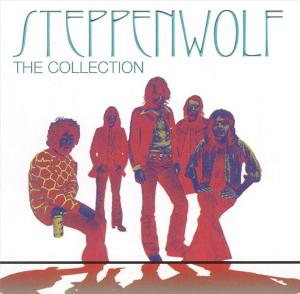
The Collection is a compilation album released in 2003 by the Canadian-American rock band Steppenwolf.


















